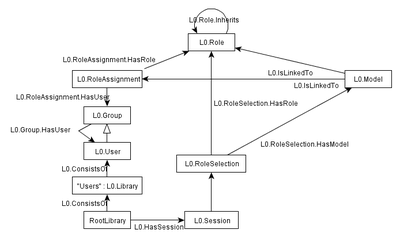Difference between revisions of "Users and Roles"
Jump to navigation
Jump to search
| Line 19: | Line 19: | ||
== Modelling == | == Modelling == | ||
| − | [[Image:UsersAndRoles.png]] | + | [[Image:UsersAndRoles.png|400px]] |
[[File:UsersAndRoles.graphml]] | [[File:UsersAndRoles.graphml]] | ||
Revision as of 14:49, 11 July 2011
User and role modelling in the semantic database is supported to enable user and use case specific user interface logic.
Basic concepts
User account
User accounts are needed in authentication of Simantics services such as database connections and experiment servers. User authentication in Simantics is based on LDAP?
User model
A user model is a representation of a user account in the Simantics database.
Role
A user always assumes a single role in the user interface. Various user interface rules can be attached into roles e.g. to allow or disallow certain operations. The user interface can also use the user and role information for selecting which data to show.
Modelling
The ontology can be found in org.simantics.layer0/graph/UsersAndRoles.pgraph
Using the model
The following guidelines are defined
- The active session role is defined in the session model
- Available users can be found under http://Users
- All roles defined in a model can be found by searching L0.Role in dependencies
- Available roles per user are queried by filtering from all roles by L0.IsAllowedFor
- Role-based rules are bound to models and can be queried by searching L0.RoleRule in model dependencies and by filtering to a selected role.
- The active role rule set is obtained by determining role-based rules for the active session role
- Application code decides how to interpret the active role rule set.
